Results
-
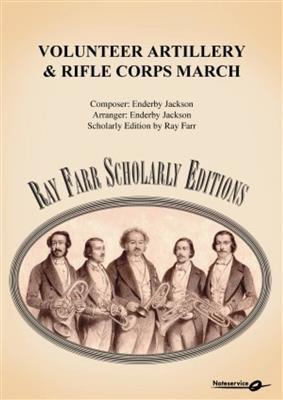 £102.60
£102.60Voluntary Artillery & Rifle Corps March - Endeerby Jackson
The march was written by Enderby Jackson and performed during a series of brass band events which took place at the Crystal Palace, London 1860 - 1863. Enderby Jackson was the organiser of these historically important events, and also conducted the massed band concerts. The Volunteer Force was a part-time, citizen army created in May 1859 by the British government as a result of increasing tensions between Britain and France. By 1862 more than 200,000 men had enlisted and were paid when on duty however, each member of the corps had to provide his own weapon and equipment.Some of the volunteer corps had bands which normally numbered between six and twelve players plus percussion1 and these bands became an important stimulant to the development of brass band.2 The corps were heavily subsidised by the government and considerable funding was spent on the bands3 which were often local brass bands. These bands were often provided with rehearsal rooms, instruments and uniforms,4 furthermore, the volunteer movement created and saved many brass bands.5Most of the musicians performing at the Crystal Palace Contests were affiliated to the Volunteer Force.
Estimated dispatch 5-14 working days
-
 £137.70
£137.70Selection Robert Le Diable - Giacomo Meyerbeer
This Selection from Giacomo Meyerbeers opera Robert le Diable was arranged by James Smyth. Enderby Jackson commissioned the arrangement which was used as the test piece for the third National Brass Band Contest held at the Crystal Palace, London in 1862.The purpose of this scholarly edition is to produce a performing version, clearing ambiguities and errors, that can be enjoyed by today's performers and listeners, bearing in mind the original function and context. At the same time the edition is an analytical, musicological study of one of the rare treasures of the brass band repertory.
Estimated dispatch 5-14 working days
-
 £102.60
£102.60General Jackson's Schottische - John Wright Tidswell
The piece was written by John Wright Tidswell and performed during Enderby Jackson's series of brass band events which took place at the Crystal Palace, London 1860 - 1863. Enderby Jackson was the organiser of these historically important occasions and also conducted the massed band concerts.The purpose of this scholarly edition is to produce a performing version, clearing ambiguities and errors, that can be enjoyed by today's performers and listeners, bearing in mind the original function and context. At the same time the edition is an analytical, musicological study of one of the rare treasures of the brass band repertory.
Estimated dispatch 5-14 working days
-
 £54.95
£54.95The Journal of Phileas Fogg - Peter Graham
Commissioned in 2012 by Dr Nicholas Childs for the National Childrens Brass Band of Great Britain, Peter Graham has taken elements of Jules Vernes epic work, Around the World in Eighty Days, as the outline for a series of adventures recorded inan imaginary diary by the hero of the story, Phileas Fogg. The ensuing journey takes Phileas by boat and train to Paris (where he passes the Moulin Rouge), Russia (where he is chased by Cossacks), Vienna (at night), Spain (where he is a spectator ata bull fight) and a final circumnavigation by sea (when foreign lands are evoked), before he arrives back in London with rich memories of his trip.
Estimated dispatch 5-14 working days
-
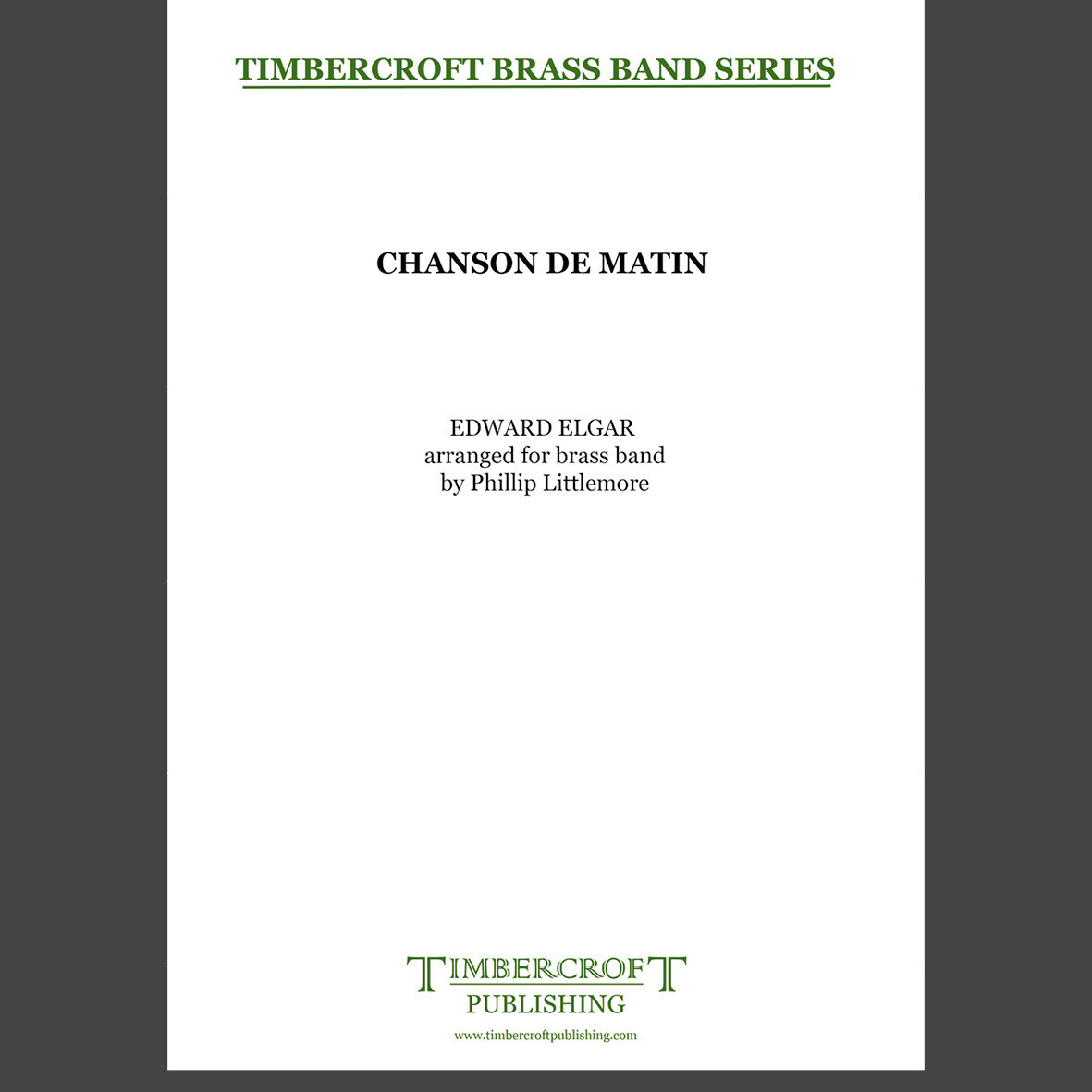 £30.00
£30.00Chanson de Matin - Edward Elgar arr. Phillip Littlemore
Chanson de Matin is typical of Elgar's wistful style which, despite the title, has come to represent a nostalgic view of his native Worcestershire and the Malvern Hills in particular. Elgar presented his publisher with this work, originally written for violin and piano, shortly after the success of his Enigma Variations . In a note to accompany the score Elgar referred to piece as something he had found and dusted off, which thought it would serve as a suitable companion piece to the Chanson de Nuit , written a few years earlier.The orchestral version, from which this arrangement is made, was premiered in September 1901 at the Queens Hall, London alongside that same companion piece, Chanson de Nuit .Duration: 3'50"Difficulty: Suitable for all grades
Estimated dispatch 5-7 working days
-
 £30.00
£30.00Jerusalem - C. Hubert H. Parry arr. Phillip Littlemore
Sir Hubert Parry wrote the music to the hymn Jerusalem in 1916, during the gloom of World War I. It uses William Blake's poem And Did Those Feet In Ancient Times which itself was written around 1804, and first published in 1808.Parry's hymn was originally written for the 'Fight for Right' movement, formed to sustain the resolve of Britain during the Great War. The hymn received its premiere on the 28th March 1916 in the Queen's Hall, London at a 'Fight for Right' meeting. In 1917, Parry conducted it for the ladies of the Albert Hall choir as part of a call in favour of National Service for Women. This signalled a closer relationship with the women's suffrage movement which Parry and his wife, Maude, supported. A year later, Jerusalem was sung at a suffrage demonstration concert and was adopted by the Women's' Institute as their anthem in 1924.There are regular calls for the hymn to be adopted as the official National Anthem of England, but this is not new. The first such call can be traced back to the centenary of Blake's death in 1927 and the call continues undimmed to this present day. This brass band arrangement is based on Parry's original orchestration from 1916.Duration: 2'20"Difficulty: Suitable for all grades
Estimated dispatch 5-7 working days
-
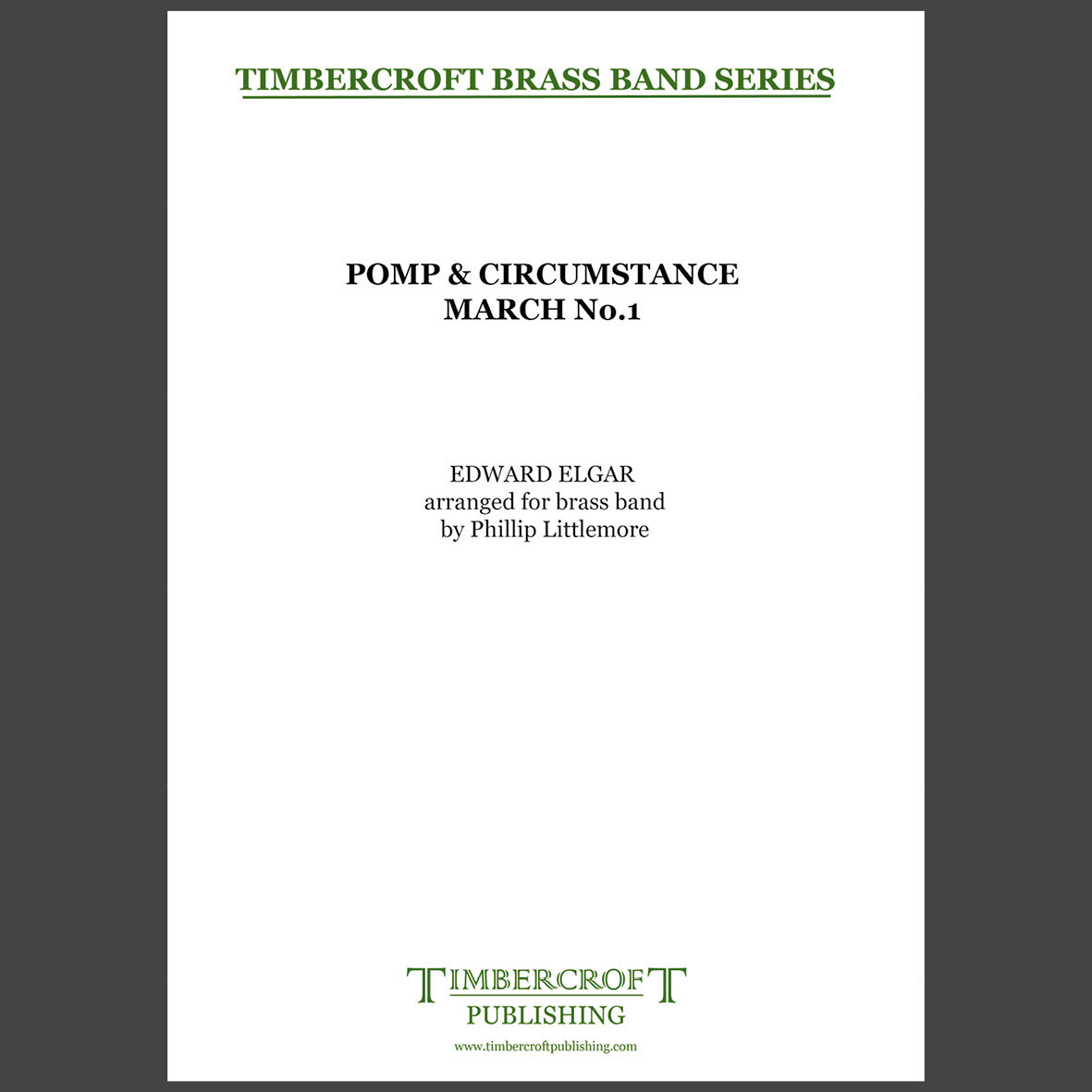 £35.00
£35.00Pomp & CIrcumstance March No.1 - Edward Elgar arr. Phillip Littlemore
Elgar's Pomp & Circumstance March No. 1 was completed in July 1901 although the 'big tune' actually dates from earlier in that same year. It was premiered in Liverpool by its dedicatees, the Liverpool Orchestral Society, on the 19th October. It was repeated in London a few days later by Henry Wood at the Promenade concerts and the result was sensational, the audience roared its applause, and refused to allow the concert to continue. In order to restore order, Wood conducted the march three times - the only time in the history of the Promenade concerts that an orchestral item was accorded a double encore in Wood's lifetime.Now a staple of the 'Last Night of the Proms', where it always manages a partial encore, and a fitting item for any such themed concerts. This new arrangement recreates the colour from the original orchestral version.A video of this arrangement can be found here: Pomp & Circumstance March No.1Duration: c.6''00"Diffculty: 3rd Section and above
Estimated dispatch 5-7 working days
-
 £35.00
£35.00Pomp & Circumstance March No.4 - Edward Elgar arr. Phillip Littlemore
Pomp & Circumstance March No. 4 was completed in June 1907, shortly after his fiftieth birthday. Like the first, it contains an equally impressive 'big tune' in the trio section, but it also matches No.1 in that it has a lively, rhythmic march element to envelope it.Unlike No.1 though, Elgar cleverly superimposes one on top of the other for the final, extended coda. Several attempts have been made to fit words to the main tune, the first of which were by the composer's wife, Alice, for her song The King's Way to celebrate the opening of a road in London. The music was then set to Alfred Noye's Song of Victory before a later attempt to make a patriotic Song of Liberty for World War II by the author A P Herbert.Duration: 4'50"Difficulty: 3rd Section and above
Estimated dispatch 5-7 working days
-
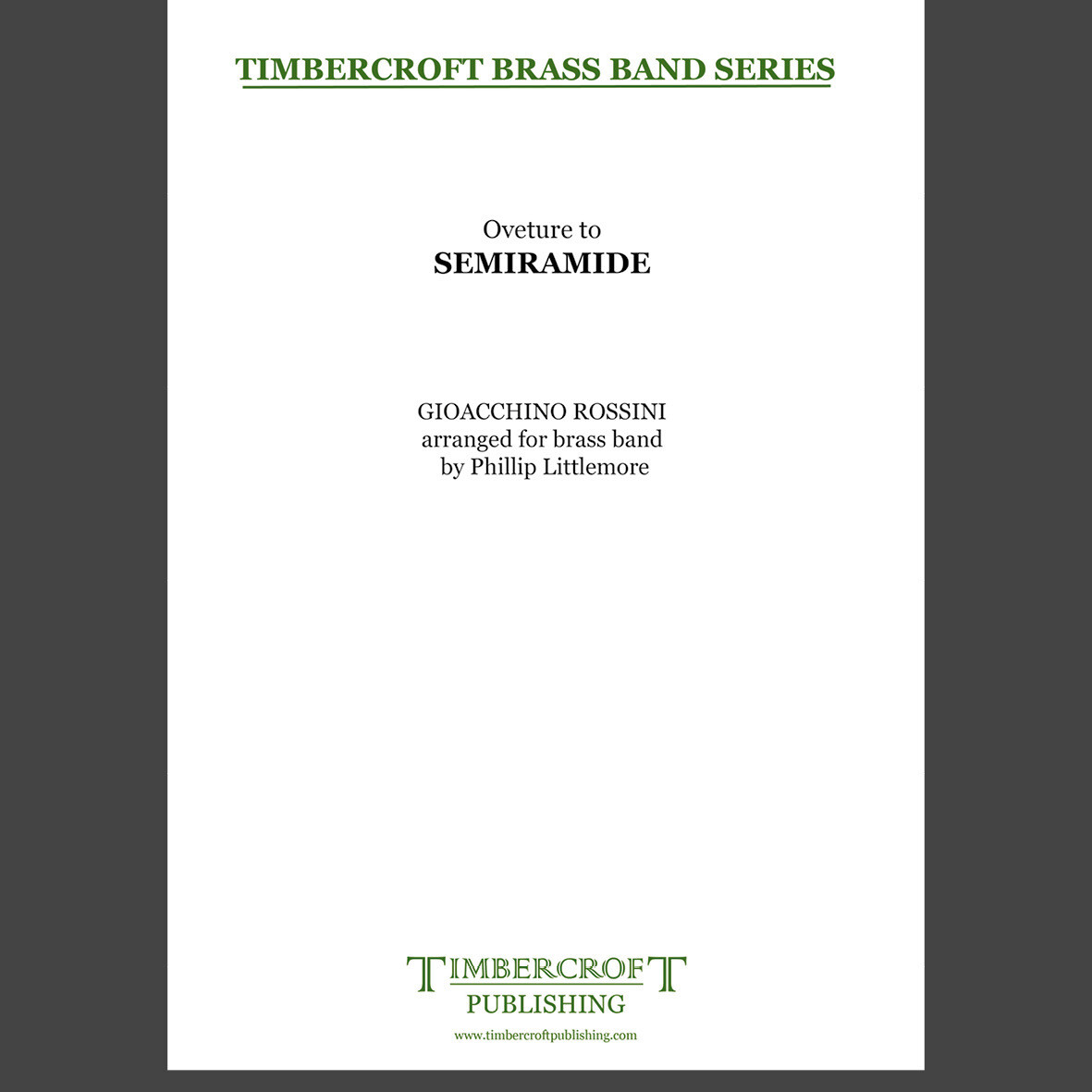 £40.00
£40.00Semiramide - Gioacchino Rossini arr. Phillip Littlemore
The Rossini Overture is practically a genre unto itself, for few other composers have had so many operatic overtures find a second home in the concert hall. Semiramide is one of Rossini's lengthier overtures, clocking in at approximately twelve minutes, although in this transcription it has been reduced to a more manageable eight minutes. Characteristically, Rossini uses several themes from the opera as the basis for his instrumental prelude. This overture became extremely popular in Rossini's day and its most distinctive feature is the rich andantino passage, introduced by the four horns that dominates the slow introduction after an opening flourish. It proved to be the last opera Rossini wrote in his native Italy. After a brief sojourn in London, he moved to Paris the following year and settled permanently in the French capital.Duration: 8 minutesDifficulty: 2nd Section and above
Estimated dispatch 5-7 working days
-
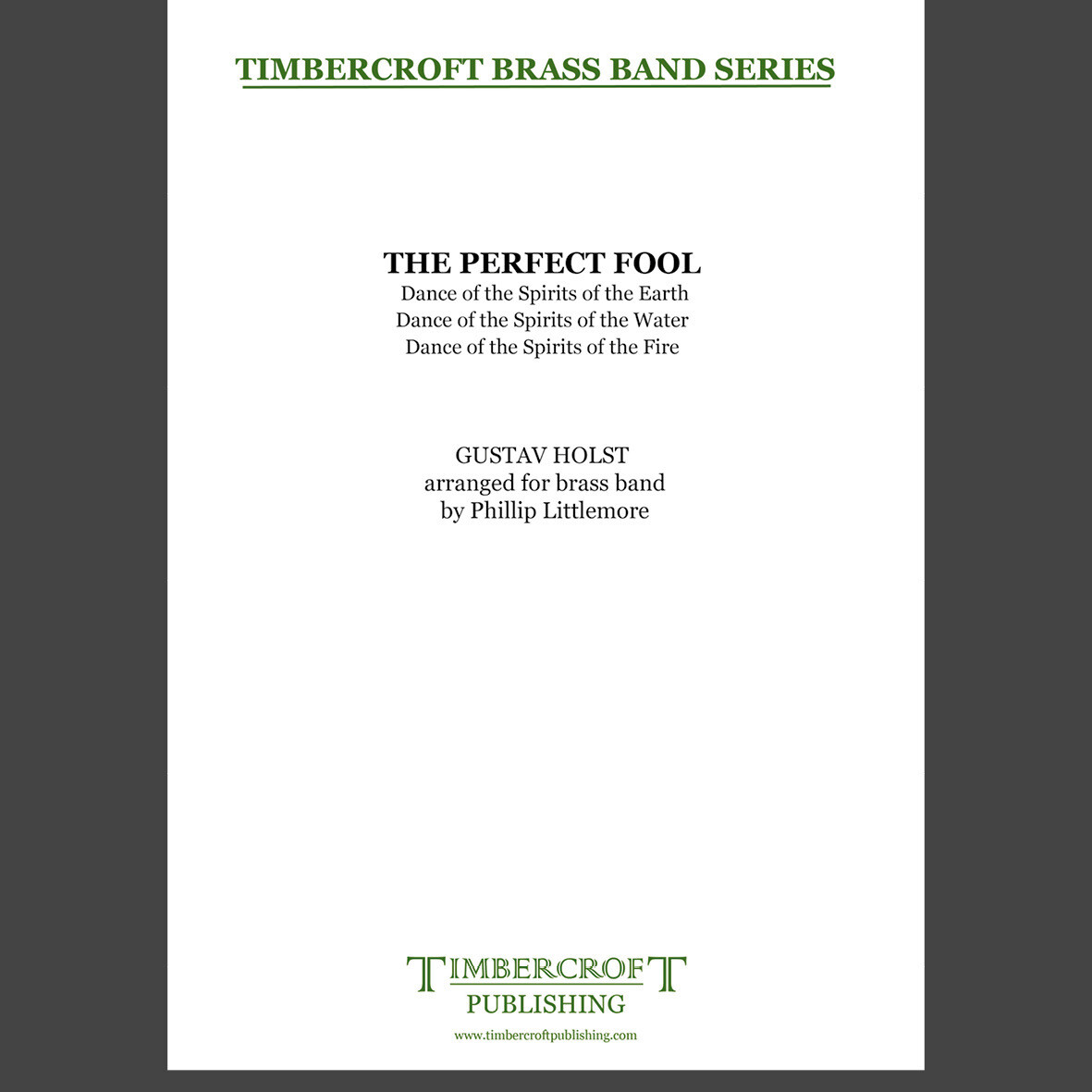 £55.00
£55.00Perfect Fool, The - Gustav Holst arr. Phillip Littlemore
The music for The Perfect Fool is taken from the comic opera by Gustav Holst, written between 1918 and 1922. The opera received its premiere at Covent Garden, London on 14th May 1923. This arrangement consists of the three dances from the ballet which starts the work: Dance of Spirits of Earth, Dance of Spirits of Water and Dance of Spirits of Fire.Duration: 9'30"Difficulty: 1st Section and above
Estimated dispatch 5-7 working days
